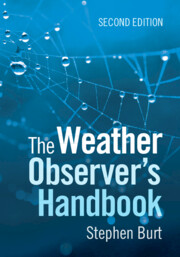Book contents
- The Weather Observer’s Handbook
- Reviews
- The Weather Observer’s Handbook
- Copyright page
- Dedication
- Epigraph
- Contents
- Foreword
- Acknowledgements
- Author’s note
- Abbreviations, footnotes and references
- Part I The basics
- Part II Measuring the weather
- 4 Site and exposure: The basics
- 5 Measuring the temperature of the air
- 6 Measuring precipitation
- 7 Measuring atmospheric pressure
- 8 Measuring humidity
- 9 Measuring wind speed and direction
- 10 Measuring grass and earth temperatures
- 11 Measuring sunshine and solar radiation
- 12 Observing hours and time standards
- 13 AWS data flows, display and storage
- 14 Non-instrumental weather observing
- 15 Calibration
- 16 Metadata: What is it, and why is it important?
- Part III Making the most of your observations
- Book part
- References and Further Reading
- Index
12 - Observing hours and time standards
from Part II - Measuring the weather
Published online by Cambridge University Press: 21 May 2024
- The Weather Observer’s Handbook
- Reviews
- The Weather Observer’s Handbook
- Copyright page
- Dedication
- Epigraph
- Contents
- Foreword
- Acknowledgements
- Author’s note
- Abbreviations, footnotes and references
- Part I The basics
- Part II Measuring the weather
- 4 Site and exposure: The basics
- 5 Measuring the temperature of the air
- 6 Measuring precipitation
- 7 Measuring atmospheric pressure
- 8 Measuring humidity
- 9 Measuring wind speed and direction
- 10 Measuring grass and earth temperatures
- 11 Measuring sunshine and solar radiation
- 12 Observing hours and time standards
- 13 AWS data flows, display and storage
- 14 Non-instrumental weather observing
- 15 Calibration
- 16 Metadata: What is it, and why is it important?
- Part III Making the most of your observations
- Book part
- References and Further Reading
- Index
Summary
For weather measurements to be comparable between different locations, the time (or times) at which observations are made, and the period covered by the measurements, should be common as far as possible. By convention, operational weather measurements throughout the world are made to a common time standard, using Coordinated Universal Time (UTC). The World Meteorological Organization (WMO) provides guidance on observation times for the main international ‘synoptic’ observing networks, while ‘climatological’ observing practice tends to be defined at a country or regional level. This chapter outlines common observing routines, with examples based upon current practice given to illustrate generally applicable principles. The importance of common time standards and common time period/s for once-daily values, such as maximum temperature or total rainfall, are stated, and the meaning, relevance and importance of ‘terminal hours’ is introduced.
Keywords
- Type
- Chapter
- Information
- The Weather Observer's Handbook , pp. 303 - 313Publisher: Cambridge University PressPrint publication year: 2024

